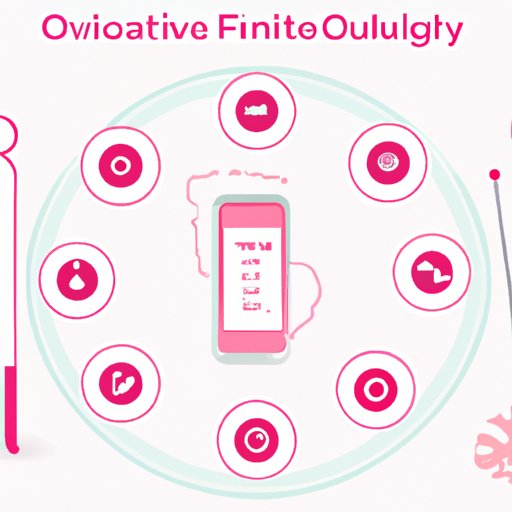
Introduction
For people trying to conceive, knowing if and when ovulation occurs is crucial. Unfortunately, it can be difficult to determine when ovulation is taking place. In this article, we will discuss several ways to know if you’re ovulating.
The Science of Ovulation
Ovulation is when the ovary releases an egg, making it available for fertilization. Ovulation typically occurs once a month, around 14 days before the start of the next period. During ovulation, the body experiences several physical changes that can indicate it is happening. These include an increased amount of cervical mucus, a rise in basal body temperature (BBT), and mild pelvic pain.
At-Home Ovulation Predictor Tests
Ovulation predictor tests (OPKs) are available over-the-counter and work similarly to pregnancy tests. These tests detect luteinizing hormone (LH), which surges just before ovulation. OPKs can be a useful tool for those trying to conceive, as they provide 24-48 hours’ notice of ovulation.
Some benefits of using at-home ovulation predictor tests include their affordability and convenience. However, some women may have trouble interpreting the test results, and they may not work for everyone.
Tracking Menstrual Cycles
Tracking menstrual cycles can be an excellent way to determine when ovulation occurs. Women can use ovulation calendars, tracking apps, or simply mark their cycle days to track their periods. Normal menstrual cycles range from 21 to 35 days, with ovulation typically occurring around day 14. Irregular periods may make pinpointing ovulation more difficult, but tracking can still provide insight into the general timing of ovulation.
Fertility Tracking Apps and Other Digital Tools
In recent years, fertility tracking apps have become increasingly popular. These apps allow women to track their menstrual cycles, basal body temperature, and other factors that can affect fertility. Some apps even use algorithms to predict when ovulation is most likely to occur, based on the data entered.
Fertility tracking tools can offer personalized insights into a woman’s cycle and give an indication of when a particular person is most likely to conceive. However, as with OV test kits, these may not be effective for everyone and requires consistent tracking of data and accuracy.
Lifestyle Factors That May Affect Ovulation
Several lifestyle choices can affect ovulation, such as exercise, diet, and stress. Women who are trying to conceive should aim for a healthy body weight and avoid extreme dieting or exercise regimens that could interfere with their menstrual cycles. Additionally, reducing stress through techniques such as yoga, meditation, or counseling could help promote healthy ovulation. A balanced lifestyle is crucial in order to ensure a peak reproductive period.
Fertility Testing and Interventions
If you have been trying to conceive for a year or more without success, it might be time to seek professional help. A doctor may run various tests to assess fertility and recommend interventions such as fertility treatments in specific cases. During such evaluations by a healthcare provider, ovarian reserve can be checked, and any underlying conditions inhibiting ovulation or conception can be identified and treated.
Conclusion
Several methods exist for determining if ovulation has occurred. Women should track their menstrual cycles, pay attention to changes in their cervical mucus and basal body temperature, use at-home ovulation predictor tests, and consider incorporating digital fertility tracking tools. It can also be helpful to consider lifestyle choices and seek professional help if needed. Understanding ovulation is crucial to those trying to conceive and nurturing a healthy sense of their body’s reproductive behaviors overall crucial to leading a happy and healthy life.





